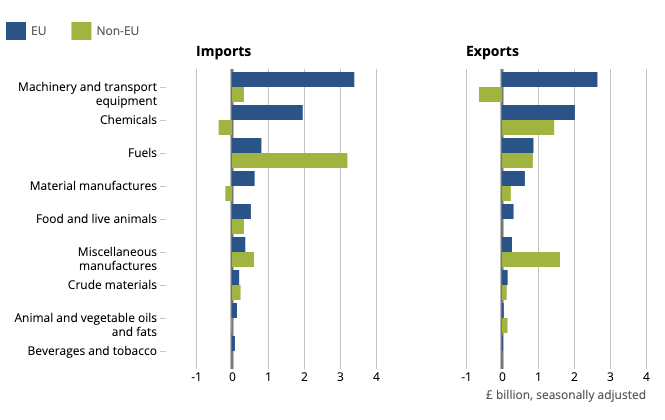Last Friday the Office of National Statistics (ONS) released the latest balance of payments data from June of this year. The balance of payments measures the transactions that Britain undertakes with other countries, and the latest report was grim. It showed that Britain is now running a trade deficit of over 4% of GDP, the largest trade deficit on record since comparable records began.
The response by leading economic commentators was bizarre. Economics Editor of The Financial Times Chris Giles tweeted the chart out with a comment reading “I hear #Brexit is going swimmingly”. But the increase in the trade deficit had nothing to do with Brexit, as anyone who read the ONS release can attest.
If Brexit were driving the deficit, we would expect exports to the EU to have fallen. Yet the data shows that between January and June of this year, exports of goods to the EU have increased 33%. In fact, the ONS release has a whole section showing charts where the Brexit transition period is clearly marked. The chart shows no unusual activity during this period with exports to the EU tracking exports to non-EU countries closely.
It is obvious what is causing the deterioration in the trade account and is clearly stated in the ONS report: rising energy costs. Britain may not be as reliant on Russian oil and gas as our European neighbours, but the price rises caused by the sanctions and Russian counter-sanctions are impacting Britain just the same. The ONS report notes that: “Increasing imports from non-EU countries in Quarter 2 2022 were driven by a £3.2 billion increase in imports of fuels, which is linked to the increasing price of oil during this period”. The chart below shows that the category where imports increased massively without being offset by higher exports is obviously fuels.

Rising energy prices do not just hit consumers, they also ruin the trade balance of countries who rely on energy imports. That category clearly includes Britain. Yet at the same time, many are using the deterioration of the trade balance to fight old political battles while ignoring the real problems. Why? Perhaps because when the sanctions were announced, many economists supported them – or, at least, they did not put very much effort into warning of their implications.
This winter Britain confronts the worst economic situation it has faced in decades. Forecasters are now saying that energy bills will cost the British consumer £5000 next year. This is simply not affordable. Our commentators and leaders have still not wrapped their heads around the economic implications of their favoured sanctions policies. But it seems unlikely that they will be able to continue to ignore these realities as the cold of winter bites.











Join the discussion
Join like minded readers that support our journalism by becoming a paid subscriber
To join the discussion in the comments, become a paid subscriber.
Join like minded readers that support our journalism, read unlimited articles and enjoy other subscriber-only benefits.
Subscribe